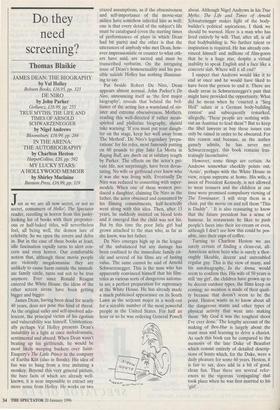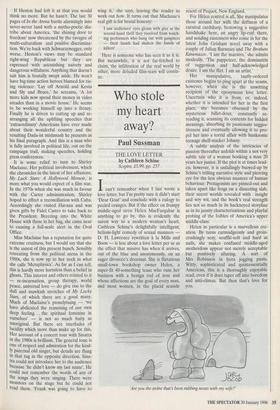Do they
need screening?
Thomas Blaikie
JAMES DEAN: THE BIOGRAPHY by Val Holley Robson Books, £16.95, pp. 323 DE NIRO by John Parker Gollancz, £16.99, pp. 255 TRUE MYTHS: THE LIFE AND TIMES OF ARNOLD SCHWARZENEGGER by Nigel Andrews Bloomsbury, £16.99, pp. 284 IN THE ARENA: THE AUTOBIOGRAPHY by Charlton Heston HarperCollins, f20, pp. 592 MY LUCKY STARS: A HOLLYWOOD MEMOIR by Shirley Maclaine Bantam Press, £16.99, pp. 319 Just as we are all now secret, or not so secret, consumers of Hello!, The Spectator reader, recoiling in horror from this junky- looking list of books with their preposter- ous or half-baked titles, will nevertheless feel, all being well, the demon lure of celebrity. So we open the covers and delve in. But in the case of these books at least, idle fascination rapidly turns to alert con- cern and even horror. Our comfortable notion that, although these movie people are violently megalomaniac they are unlikely to cause harm outside the immedi- ate family circle, turns out not to be true anymore. Ever since Ronald Reagan entered the White House, the ideas of the other screen sirens have been getting bigger and bigger.
James Dean, having been dead for nearly 40 years, does not pose this kind of threat. As the original sulky and self-involved ado- lescent, the principal victim of his egotism and vulnerability was himself. Unintention- ally perhaps Val Holley presents Dean's instability in a light at once melodramatic, sentimental and absurd. When Dean wasn't beating up his girlfriends, he would be most likely weeping buckets over Saint- Exupery's The Little Prince in the company of Eartha Kitt (also in floods). His idea of fun was to hang from a tree imitating a monkey. Beyond this very general picture, the bare facts of which are already well- known, it is near impossible to extract any more sense from Holley. He works on two crazed assumptions, as if the obsessiveness and self-importance of the movie-star milieu have somehow infected him as well: one is that every detail of the subject's life must be catalogued (even the starting times of performances of plays in which Dean had bit parts) and the other is that the utterances of anybody who met Dean, how- ever impressionistic or counter to what oth- ers have said, are sacred and must be transcribed verbatim. On the intriguing issue of Dean's homosexuality and his pos- sible suicide Holley has nothing illuminat- ing to say.
Put beside Robert De Niro, Dean appears almost normal. John Parker's De Niro, announcing itself as 'the first major biography', reveals that behind the bril- liance of the acting lies a wasteland of sin- ister and extreme obsessiveness. Mothers, reading this well-directed if rather mean- spirited and philistine biography, should take warning: 'If you must put your daugh- ter on the stage, keep her well away from The Method'. De Niro's legendary 'prepa- rations' for his roles, most famously putting on 60 pounds to play Jake La Motta in Raging Bull, are dwelt on at salutary length by Parker. The effects on the actor's pri- vate life, not surprisingly, have been devas- tating. No wife or girlfriend ever knew who it was she was living with. Eventually De Niro was reduced to consorting with super- models. When one of these women pro- duced a daughter, claiming De Niro as the father, the actor obsessed and consumed by his filming commitments, half-heartedly went along with this idea. Then, after 13 years, he suddenly insisted on blood tests and it emerged that the child was not his. But by this time the poor little girl had grown attached to the man who, as far as she knew, was her father.
De Niro emerges high up in the league of the unbalanced but any damage has been confined to the immediate family cir- cle and several of his films are of lasting value. The same cannot be said of Arnold Schwarzenegger. This is the man who has apparently convinced himself that his film- roles as various sorts of dangerous automa- ta are a perfect preparation for supremacy at the White House. He has already made a much publicised appearance on its South Lawn as the serjeant major in a work-out for a sizeable number of the most powerful people in the United States. For half an hour or so he was ordering General Powell about. Although Nigel Andrews in his True Myths: The Life and Times of Arnold Schwarzenegger makes light of the body- builder's political aspirations, I think we should be warned. Here is a man who has lived entirely by will. That, after all, is all that bodybuilding is. No further talent or inspiration is required. He has already con- vinced himself and millions of film-goers that he is a huge star, despite a virtual inability to speak English and a face like a concrete slab. Where will it all end?
I suspect that Andrews would like it to end at once and he would have liked to have been the person to end it. There are shady areas in Schwarzenegger's past that might have provided the opportunity. What did he mean when he 'enacted a "Sieg Heil" salute at a German body-building contest' and subsequently remarked, allegedly, 'These people are nothing with- out an Austrian to lead them'? But to keep the libel lawyers at bay these issues can only be raised in order to be obscured. For this reason and because, as the author gamely admits, he has never met Schwarzenegger, this book remains frus- tratingly inconclusive.
However, some things are certain. As Andrews somewhat cheekily points out, `Arnie', perhaps with the White House in view, reigns supreme at home. His wife, a niece of President Kennedy, is not allowed to wear trousers and the children at one time were promised compulsory viewing of The Terminator: 'I will strap them in a chair, put the movie on and tell them "This is Daddy". ' It is also reassuring to know that the future president has a sense of humour. In restaurants he likes to push people's faces into their ice-cream or even, although I don't see how this could be pos- sible, into their cups of coffee.
Turning to Charlton Heston we are surely certain of finding a clean-cut, all- American action hero who is surely a thor- oughly likeable, decent and untroubled regular guy. This is the view of many, and his autobiography, In the Arena, would seem to confirm this. His wife of 50 years is still 'my girl', the children have grown up to be decent outdoor types, the films keep on coming; no mention is made of their quali- ty because that doesn't seem to be the point. Heston wants us to know about all the dangerous stunts and other types of physical activity that went into making them: 'My God it was the toughest shoot I've ever done.' The lengthy account of the making of Ben-Hur is largely about the stunt man and learning to drive a chariot. As such this book can be compared to the memoirs of the late Duke of Beaufort which consist entirely of detailed descrip- tions of hunts which, for the Duke, were a daily pleasure for some 60 years. Heston, it is fair to say, does add in a bit of good, clean fun. Thus there are several refer- ences to the vigorous `conjugaling' that took place when he was first married to his `girl'. If Heston had left it at that you would think no more. But he hasn't. The last 30 pages of In the Arena hurtle alarmingly into never-never land with a mytho-poetic dia- tribe about America, 'the shining door to freedom' now threatened by the ravages of multi-culturalism and positive discrimina- tion. We're back with Schwarzenegger, only worse. Heston's views may be standard right-wing Republican but they are expressed with astonishing naivety and dangerous wilfulness. Anything that doesn't suit him is brutally swept aside. He won't have big-time action heroes blamed for ris- ing violence: lay off Arnold and Kevin and Sly and Bruce,' he screams, 'A lot more kids now spend their money in video arcades than in a movie house.' He seems to be working himself up into a frenzy. Finally he is driven to cutting up and re- arranging all the uplifting speeches that `extraordinary' Americans have ever made about their wonderful country and the resulting Dada-ist mishmash he presents as his final paragraph. And this is a man who is fully involved in political life, out on the campaign trail, making speeches, holding press conferences.
It is some relief to turn to Shirley Maclaine. Her political involvement, which she chronicles in the latest of her effusions, My Luck Stars: A Hollywood Memoir, is more what you would expect of a film star. In the 1970s when she was much in favour with the Carter administration, Shirley hoped to effect a reconciliation with Cuba. Accordingly she visited Havana and was given gifts by Fidel Castro to take back to the President. Breezing into the White House with these in her bag, she came near to causing a full-scale alert in the Oval Office.
Miss Maclaine has a reputation for quite extreme craziness, but I would say that she is the sanest of this present bunch. Sensibly retreating from the political arena in the 1980s, she is now up to her neck in what she calls 'Metaphysics'. As far as I can tell, this is hardly more harmless than a belief in ghosts. This interest and others related to it — re-incarnation, group therapy, world peace, universal love — do give rise to the dull and mawkish stretches of My Lucky Stars, of which there are a good many. Much of Maclaine's proselytising — have abdicated the reasoning of our own deep feeling. . . the spiritual feminine in ourselves' — is not so much batty as unoriginal. But there are interludes of lucidity which more than make up for this. Her account of a concert tour with Sinatra in the 1980s is brilliant. The general tone is one of respect and admiration for the kind- ly paternal old singer, but details are flung in that tug in the opposite direction. Sina- tra could not introduce her to the audience because 'he didn't know my last name'. He Could not remember the words of any of the songs they were singing. There were monitors on the stage but he could not read them. 'Frank was going to have to wing it,' she says, leaving the reader to work out how. It turns out that Maclaine's real gift is for brutal honesty:
I saw audiences' eyes gleam with glee at the second-hand thrill they received from watch- ing performers who hung out with gangsters — their hands had shaken the hands of killers!
Here is someone who has seen it as it is. But meanwhile, it is not far-fetched to claim, the infiltration of the real world by other, more deluded film-stars will contin- ue.



























































 Previous page
Previous page